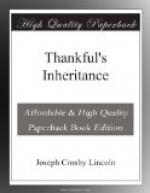A last wave of Thankful’s hand, the answering wave of a handkerchief from the rear seat of the depot-wagon, and the parting was over. Thankful went into the house. Lonely! She had never been more lonely in her life, except when the news of her husband’s death was brought to her. The pang of loneliness which followed her brother Jedediah’s departure for the Klondike was as nothing to this. She had promised not to worry, and she must keep that promise, but there was certainly plenty to cause worry. The mortgage which Emily had so comfortably declared “all right” was far from that. Solomon Cobb had not been near her since their interview. He had not yet said that he would renew the mortgage when it fell due. Mrs. Barnes began to fear that he did not intend to renew it.
Heman Daniels, when he came in for supper, seemed disturbed to find that Miss Howes had gone. Somehow or other he had gained the impression that she was to leave the next morning.
“Did she—did Miss Howes leave no message for me?” he inquired, with a carelessness which, to Thankful, seemed more assumed than real.
“No,” answered the latter, “no, unless you call it a message about takin’ the responsibility of Holliday Kendrick and his schemes off my hands. That is,” remembering Emily’s desire not to have her name mentioned in the matter, “she didn’t leave that. But I guess you can take charge of that mess, if you want to.”
Mr. Daniels smiled a superior smile. “I intended doing so,” he said, “as a matter of friendship, Mrs. Barnes. You may rest easy. I have taken pains to let the town-folks know that your interests are mine and I think our—er—late—er—friend is learning what our best citizens think of his attitude.”
There was truth in this statement. John Kendrick had foreseen the effect upon his popularity which his espousal of his wealthy relative’s cause might have and his prophecy concerning “moral leprosy” was in process of fulfillment. Opinion in the village was divided, of course. There were some who, like Darius Holt, announced that they did not blame the young yellow. E. Holliday had money and influence and, as a business man, his attorney would be a fool not to stick by the cash-box. But there were others, and these leading citizens and hitherto good friends, who openly expressed disgust both with the rich man and his lawyer. Several of these citizens called upon Thankful to tell her of their sympathy and of their wish to help her in any way.
“Not that you’re liable to need help,” said one caller. “This property’s yours and even John D. himself couldn’t get it from you unless you were willin’. But it’s a dirty trick just the same and young Kendrick, that all hands thought was so straight and honest, takin’ part in it is the dirtiest thing in it. Well, he’s hurt himself more’n he has anybody else.”




